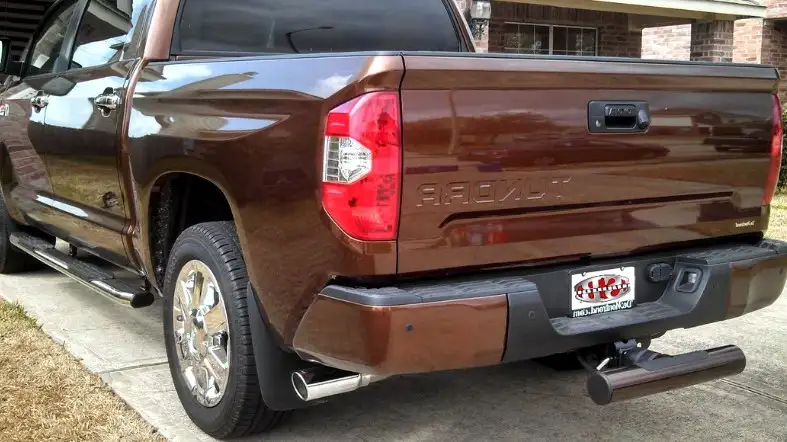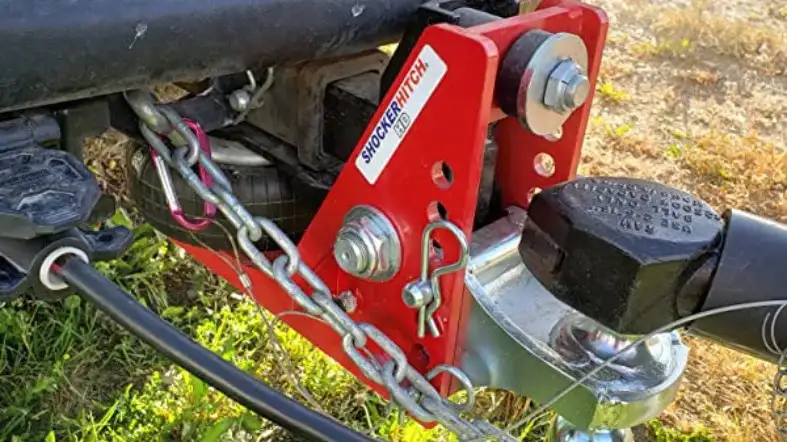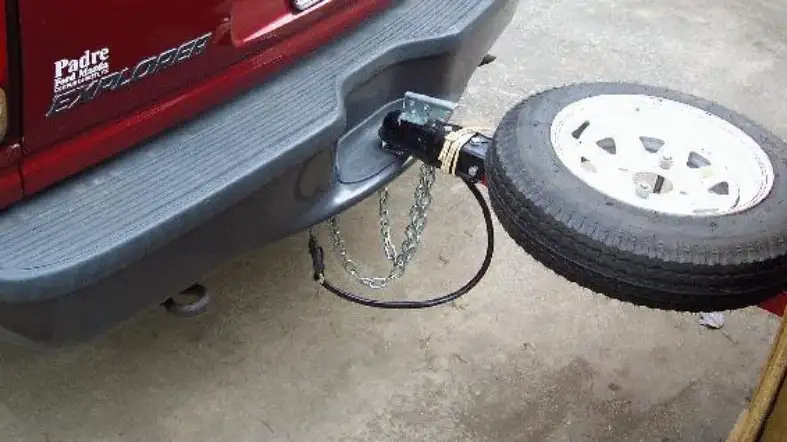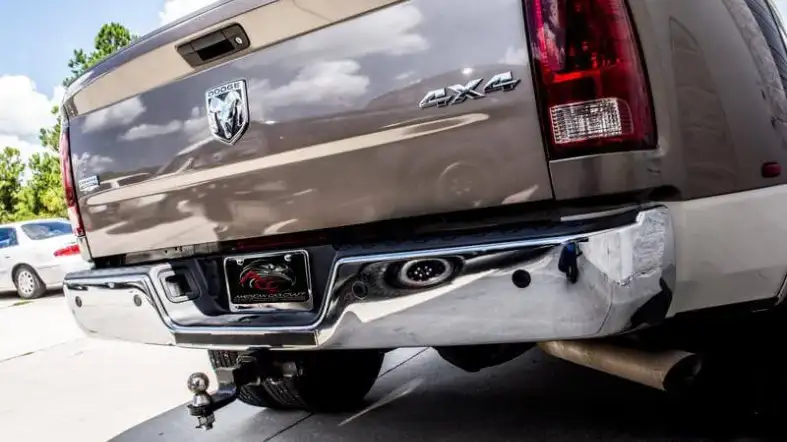When it comes to towing, there are a few different options out there.
If you’re looking for the most power and stability, a bumper hitch is a way to go.
But, how much weight can a bumper hitch pull?
In this article, we’re going to break down everything you need to know about bumper pulling and how much weight your bumper hitch can handle.
How Much Weight Can A Bumper Hitch Pull?
A bumper hitch can pull up to 6,000 lbs. A bumper hitch is supposed to be sturdy and durable.

However, if all of your weight is being pulled on one end, then your vehicle might not be able to handle that force without buckling under all of the pressure.
Here you can find some weight limits based on the bumper hitch types through the below table:
| Hitch Type | Weight Limit |
|---|---|
| Class I | 2,000 lbs |
| Class II | 3,500 lbs |
| Class III | 5,000 lbs |
| Class IV | 10,000 lbs |
| Class V | 12,000 lbs |
Note: The weight limit for a bumper hitch will depend on the class of the hitch and the vehicle’s towing capacity.
It is important to check the specifications of both the hitch and the vehicle to determine the maximum weight that can be safely pulled.
What Happens if I Exceed My Bumper Hitch Weight?
There are so many things that can happen if you go too heavy on your bumper hitch.
If you exceed the weight capacity of your bumper hitch, it can result in a variety of dangerous consequences.
Towing vehicle becomes unstable
If the weight of the trailer exceeds the weight capacity of the hitch, it can cause the towing vehicle to become unstable.
Also, make it difficult to control and potentially causes accidents.
Hitch becomes damaged
Exceeding the weight capacity of the hitch can cause it to become damaged.
Potentially, it leads to a failure of the hitch and the trailer becoming detached from the towing vehicle.
Vehicle exceeds the maximum weight limit
If the weight of the trailer and its contents exceed the maximum weight limit of the towing vehicle, it can cause the vehicle to become overloaded and potentially lead to a loss of control.
Risk of injury
Exceeding the weight capacity of the hitch can also put individuals at risk of injury, both in the towing vehicle and on the road.
Some Safety Considerations When Using A Bumper Hitch

In addition to the weight of your vehicle, one important consideration when using a bumper hitch is the laws in your state.
Different states have different regulations on how much weight you can pull with a bumper hitch and whether or not they are required.
In some cases having an extra-heavy load that’s pulling against your bumper hitch could damage it or even make it unsafe to use.
To minimize any potential safety risks, it’s always a good idea to check your state’s laws and regulations before using a bumper hitch.
If you’re unsure of what the weight limit is in your area, take your vehicle to a reputable dealership for an assessment.
They can help you find the best bumper hitch to fit your needs and ensure that your vehicle is safe and secure when it’s pulling a heavy load.
Overall, using a bumper hitch can be a great way to haul large items or transport heavy cargo with ease.
But it’s important to do your research and follow any safety guidelines to ensure your vehicle is safe and secure.
Tips For Using Your Bumper Hitch Safely And Effectively

When lifting and pulling heavy objects, it is important to use a rated bumper hitch.
But if you follow the below tips then you can use your bumper hitch safely and effectively.
1. The first thing you will want to do is measure the weight of the object.
If it does not have an indication on its label, then consult with whoever is selling the object to determine how much weight it can hold.
2. Find a level surface to attach your bumper hitch. You will want to make sure that the ground is even and free of obstructions, such as rocks or potholes.
3. If you have attached your bumper hitch, carefully pull up on the object until it is at a height where you can safely lift it with ease.
If needed, secure the object to the bumper hitch with straps or ropes.
4. When everything is secure, slowly begin pulling up on the object and make sure that it does not scrape against any surfaces as it moves upward.
5. If you are pulling a vehicle out of a ditch, then move very slowly and avoid sudden jerks or movements to avoid crashing into anything.
6. Be sure to use a safe lifting technique and pay close attention to your surroundings as you move the object.
And of course, always be mindful of any safety warnings on your bumper hitch itself.
Factors That Affect A Bumper Hitch Weight Capacity
Factors that affect the weight capacity of a bumper pull hitch include the design and material composition, as well as its rating.
For example, heavier-duty trailer hitches are typically made from durable steel or forged aluminum to handle heavier loads.
These materials offer superior strength compared to other options such as plastic or lightweight metal alloys.
In addition, the rating of the bumper pull hitch can also have an effect on its weight capacity.
Generally speaking, hitches with a higher gross trailer weight (GTW) rating will be able to carry heavier loads than those rated for lower GTWs.
Therefore, if you are looking for a bumper pull hitch that can handle heavier objects or more weight.
You will want to pay close attention to the materials and ratings of these hitches when making your purchase.
At the end of the day, a bumper pull hitch is an essential tool for towing and hauling heavy objects safely and securely.
Things To Consider Before You Get A Bumper Hitch Installed

If you consider the following before you buy a bumper hitch, you’ll find one that fits your towing needs perfectly:
Heavy a Load
Bumper hitches come in different weight capacities.
So it’s important to consider what kind of loads you plan on carrying with your vehicle when choosing a bumper hitch.
Heavy loads require stronger hitches, while lighter towing needs can be met with a smaller and more affordable option.
Vehicle Type
Bumper hitches are designed for specific vehicles.
Make sure that your car or truck is compatible before making a purchase.
Some bumpers are more flexible and can accommodate various vehicles, while others are vehicle-specific.
Make sure to do your research ahead of time so that you can avoid purchasing a hitch that isn’t compatible with your car or truck.
Use of bumper hitch
If you plan on using your bumper hitch frequently and regularly, you may want to invest in a more heavy-duty and durable model.
However, if you only need your bumper hitch infrequently or for occasional use, a lower-quality model might be sufficient.
Vehicle Equipped with a Receiver
Many bumpers have receivers built-in, but some do not.
If you don’t have a receiver on your vehicle, it’s important to consider whether or not you want to get one installed before purchasing a bumper hitch.
Installing a receiver can be costly and time-consuming, but it may be necessary in order for your vehicle to accommodate certain types of hitches.
If you take the time to consider these factors, you’ll be able to find the perfect bumper hitch for your needs.
And with proper care and maintenance, it should last you for years to come.
FAQs on How Much Weight Can A Bumper Hitch Pull
What are the different classes of bumper hitches?
Bumper hitches are classified based on their weight capacity, with Class I hitches having the lowest weight capacity.
And Class V hitches have the highest weight capacity.
What is the maximum weight capacity of a Class I bumper hitch?
The maximum weight capacity of a Class I bumper hitch is 2,000 lbs.
Can a bumper hitch be used to tow a boat?
Yes, a bumper hitch can be used to tow a boat, as long as the weight of the boat and trailer does not exceed the weight capacity of the hitch.
What should I do if I am unsure of the weight capacity of my bumper hitch?
If you are unsure of the weight capacity of your bumper hitch, it is recommended that you consult the owner’s manual of your vehicle or contact the manufacturer for more information.
It is also important to check the weight of the trailer and its contents to ensure that they do not exceed the weight capacity of the hitch.
Conclusion
Now you are able to know how much weight a bumper hitch can pull.
With the right materials, ratings, and care, you can safely use your bumper hitch for towing and hauling heavy objects of all kinds.
Also know what to consider when purchasing a bumper hitch, such as weight capacity, vehicle type, and receiver compatibility.
So whether you need to haul large items or are simply looking for an affordable way to tow your trailer or boat, be sure to consider all of your options when shopping for a bumper hitch.
